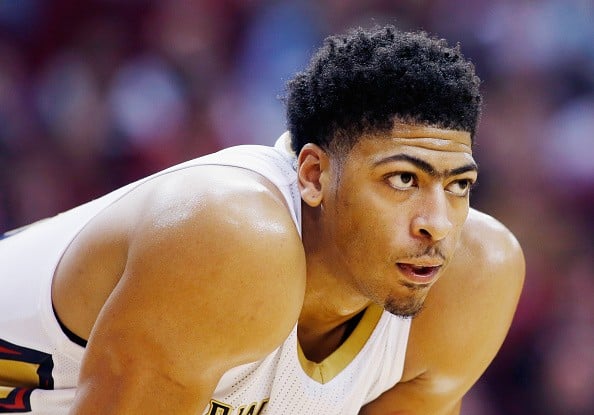About a month ago, Anthony Davis had a monster 59-point, 20-rebound performance. At the time, we thought he was on his way to making another All-NBA team, an honor awarded to the top 15 players in the league.
However, the Pelicans just shut down Davis for the rest of the season, and it may end up costing him $24 million.
Why? Last off-season, the Pelicans signed Davis to a five-year, $145 million extension. That's the maximum they could pay him, though the deal was assuming Davis would satisfy the criteria of the "Rose Rule."
A quick recap: Normally, NBA rules dictate that a player with Davis's level of NBA experience (between zero and six years) can earn up to 25 percent of the salary cap per year. That's considered a "max salary" for a player who's still fairly new to the league. For players with seven to nine years experience, they can earn up to 30 percent of the salary. But with the Rose Rule, those newbies can get a raise up to 30 percent, provided they meet one of the following criteria:
- The player wins MVP in at least one season
- The player is voted an All-Star at least twice (note he must be VOTED in as a starter; simply being named to the team as a reserve does not satisfy this requirement)
- The player is named to the All-NBA First, Second or Third team at least twice
Davis has already missed his opportunity to be voted into two All-Star games, and if Steph Curry isn't a lock to win his second straight MVP award, Kawhi Leonard is there to pick up the slack. That means Davis has one option: make the All-NBA First, Second or Third team. He's made it once in his career (last year, the same year he was voted an All-Star), and one more time will get him an additional $24 million. The projected $145 million contract would be an NBA record in terms of dollars and average annual value.
However, it was already a fairly long shot for Davis to be named to an All-NBA team. For one–there's a lot of competition already, and Davis is fighting for one of nine frontcourt spots.
The biggest argument against him, though, is that despite strong performances on the court, the Pelicans haven't won many games. They've been hovering around 15 to 20 games under .500 for most of the year. In the past 10 seasons, 150 players have made an All-NBA team, and a whopping 94 percent of them were on a team that made the postseason. Davis' Pelicans certainly won't make the postseason. And with him out, they're even worse–it's not going to look good if they finish at something like 29-53.

Scott Halleran / Getty Images
If he doesn't play another game the rest of the year, Davis will have missed 21 games. That's more than a quarter of the season. Since the NBA-ABA merger in 1976, only 61 players have made an All-NBA team playing 61 or fewer games, which is how many Davis has suited up for. And just four of those players were on teams with losing records.
Of course, Davis is still having a terrific season, even though he's been hampered by injuries. He's averaging a double-double, and he's in the top 10 in points, rebounds, and blocks per game, plus among the leaders in Player Efficiency Rating (PER).
Prior to this year, 39 players have had numbers on par with what Davis has put up. 36 of those times, that player made an All-NBA team.
If he doesn't play another game this year, Davis somehow has history both on his side and against him. We'll see which way the voters of the All-NBA teams lean.
/2016/02/Anthony-Davis.jpg)
/2016/01/GettyImages-460657074.jpg)
/2016/05/Anthony-Davis.jpg)
/2019/02/GettyImages-946404826.jpg)
/2018/05/anthony.jpg)
/2022/03/anthony-davis.png)
/2019/01/James-Altucher.jpg)
/2013/12/dan.jpg)
/2011/12/John-Mara-1.jpg)
:strip_exif()/2020/06/taylor.png)
/2010/12/kate-1.jpg)
/2020/10/the-miz.png)
/2011/12/Rooney-Mara1.jpg)
/2020/08/gc-1.jpg)
/2014/04/GettyImages-886617106.jpg)
/2011/01/Aaron-Rodgers.jpg)
/2022/10/peter-krause.jpg)
/2010/03/emil.jpg)
/2020/04/hailey-joel.png)
/2015/09/Daley-Thompson.jpg)
/2020/10/david.jpg)
/2009/11/Brandon-Jennings.jpg)
/2019/01/Kennedy-Montgomery.jpg)